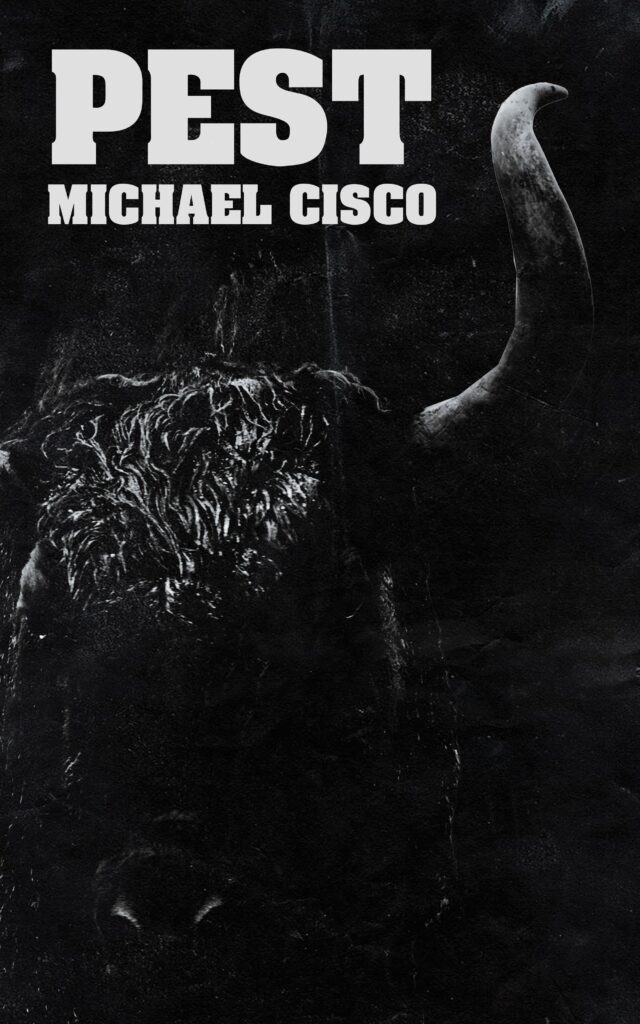
Two seemingly contradictory things can be true at the same time, and it is in the spirit of that timeless adage that I will make the next two sentences. Michael Cisco’s novel Pest is about a man who is also a yak, and Michael Cisco’s novel Pest is one of the more accessible works in the bibliography of one of the nation’s most singular writers of full-bore Weird fiction.
Pest begins with the first person narration of an as-yet-unnamed man as he reacts to both occupying the body of a yak – no hands, eyes on each side of his head, a body he cannot see – and the larger cluster of yaks around him. There’s one phrase in particular that comes off as intentionally jarring: a brief reference to “the Cathedral demons, the ‘book people,’” which seems designed to provoke questions beyond simply, so, why exactly is this guy a yak?
And immediately afterwards, Cisco offers the reader something of a lifeline in the person of one Dr. Achittampong, who’s observing a comatose patient by the name of Chalo Detto, an engineer by trade. The doctor’s conversation with a nurse suggests that whatever Chalo is experiencing is part of some larger epidemic – and that Chalo has been unconscious ever since “[s]omething happened to him at the construction site.” Not longer after this, our yak narrator confirms that he is, somehow, Chalo. “I can’t tell my own story now,” he thinks — and, oddly, derives a kind of comfort from this.
What follows takes place largely in three narrative threads: Chalo’s life as a yak; glimpses of Chalo in the hospital, as the medical staff ponders something known as Catalina Syndrome; and the story of how Chalo came to this point, which involves being hired by a man named Grant on an ambitious architecture project. “My involvement in architecture is entirely confined to explaining to architects why they won’t be able to do most of what they want to do,” he thinks at one point — and yet Grant’s enthusiasm is contagious.
Grant makes his intentions clear (or at least somewhat clear) in a conversation with Chalo early in the novel. He says that he doesn’t want “another hippie, new age commune” — though he does plan to herald the arrival of some sort of “being.” (He will subsequently use the phrases “A Special Guest. An Ancient Newborn.” to describe this entity.) And it’s all set to happen on Catalina Island.
Pest is a novel with its own bizarre logic, from Grant’s potentially supernatural charisma to the bleak comedy that arises when AC, a woman Grant hires to do some translation, finds the assignment too daunting. “[N]ext day she sits down and just makes up a bunch of plausible-sounding stuff,” Cisco (himself a translator) writes. “He won’t know the difference.”
Somehow, this manages to attract the attention of what appear to be actual supernatural beings, which also involves allusions to the deeply unsettling sculptures of exaggerated human heads by Franz Xaver Messerschmidt and speak in a stylized version of Middle English. Things get steadily stranger from there, with Cisco tapping into some of the same thematic ground surrounding financial systems and hierarchical organizations as he did in his mammoth Animal Money.
All of this makes Pest both deeply strange and bleakly funny, often at the same time. The notion of a pair of demons showing up at a bank and saying, “We’re here to discuss the issuaence of a credit waiever in connection with loaen applicaetion 430233” is deeply strange, yet also comic — even as the end results are deadpan and horrific.
There are a lot of moments like that in this novel. (AC’s backstory is also magnificently unsettling, to cite one example.) But even as this novel’s story spirals into discussions of art, architecture, mysticism, and translation, Chalo’s predicaments keep Pest emotionally grounded. Demons speaking in archaic tones and charismatic prophets are not figures you encounter every day. Someone just looking for a fulfilling job who’s willing to overlook some red flags to get there and pays dearly for it? That’s a storyline that’s all too relevant — and as the structure of Pest encircles Chalo even more, its implications grow that much more ominous.
***
Pest
by Michael Cisco
CLASH Books; 250 p.
Follow Vol. 1 Brooklyn on Twitter, Facebook, and sign up for our mailing list.
